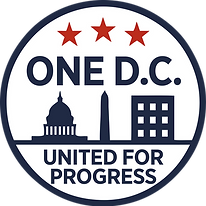
TRACEY L. LUCAS FOR D.C. MAYOR
CAMPAIGN PLATFORM 6
Equity in Public Service
Platform: A City That Works for Everyone
-
Prioritize underserved wards by increasing access to quality education, healthcare, and public infrastructure.
-
Establish an Equity Office to audit government services and ensure fair distribution of resources.
-
Expand affordable housing options by investing in projects in wealthier areas to fund equity-focused initiatives.
-
Projected Contribution: $30 million over 5 years.
Signature Proposal: The Equity First Initiative – $300 million dedicated to schools, clinics, and infrastructure in Wards 7 and 8 over five years.
Funding Strategy: Funding the Equity in Public Services platform and the Equity First Initiative will require a multifaceted strategy, combining reallocation of existing funds, securing new revenue sources, and leveraging partnerships. Below is a detailed funding plan:
1. Reallocation of Existing Budget
-
Efficiency Audits: Conduct audits across city departments to identify wasteful spending and redirect those funds toward underserved areas.
-
Potential Savings: $20–40 million annually.
-
Tax Increment Financing (TIF): Redirect a portion of future tax revenues generated from economic development projects in wealthier areas to fund equity-focused initiatives.
-
Projected Contribution: $30 million over 5 years.
2. New Revenue Sources
-
Progressive Tax Reforms: Increase taxes on luxury property sales (over $5 million) and higher-income brackets (top 1%).
-
Projected Revenue: $50–75 million annually.
-
Real Estate Transaction Fees: Apply targeted fees to high-value commercial transactions to generate funds specifically for public housing and infrastructure in underserved wards.
-
Projected Revenue: $15 million annually.
3. Public-Private Partnerships
-
Affordable Housing Incentives: Partner with private developers to incentivize affordable housing construction through tax credits or density bonuses in exchange for financial contributions to public housing renovations.
-
Projected Investment: $75 million over 5 years from developers.
-
Healthcare Collaborations: Partner with nonprofit healthcare organizations and hospitals to co-fund clinic expansions in underserved wards.
-
Projected Contribution: $30 million over 5 years.
4. Federal and Grant Funding
-
Federal Grants: Apply for competitive federal grants such as HUD’s Community Development Block Grants and U.S. Department of Education grants targeting underfunded schools.
-
Projected Contribution: $50–70 million over 5 years.
-
Infrastructure Grants: Leverage funds from programs like the Bipartisan Infrastructure Law for public infrastructure upgrades.
-
Projected Contribution: $40 million over 5 years.
5. Community Investment Bonds
-
Issue Community Equity Bonds, allowing residents and local businesses to invest in the Equity First Initiative with guaranteed returns.
-
Projected Revenue: $50 million over 5 years.
6. Philanthropic Contributions
-
Partner with foundations and charitable organizations focused on urban development, education, and healthcare equity.
-
Projected Contribution: $35 million over 5 years
Projected Funding Breakdown
Source
Amount (5 Years)
Reallocation of Existing Budget
Progressive Tax Reforms
Public-Private Partnerships
Federal and Grant Funding
Community Investment Bonds
Philanthropic Contributions
$30 million
$250 million
$105 million
110 million
$50 million
$35 million
Total
$580 million
Conclusion
This funding approach not only covers the $300 million for the Equity First Initiative, but also provides additional resources to sustain long-term equity improvements across DC while avoiding an undue burden on working-class residents.